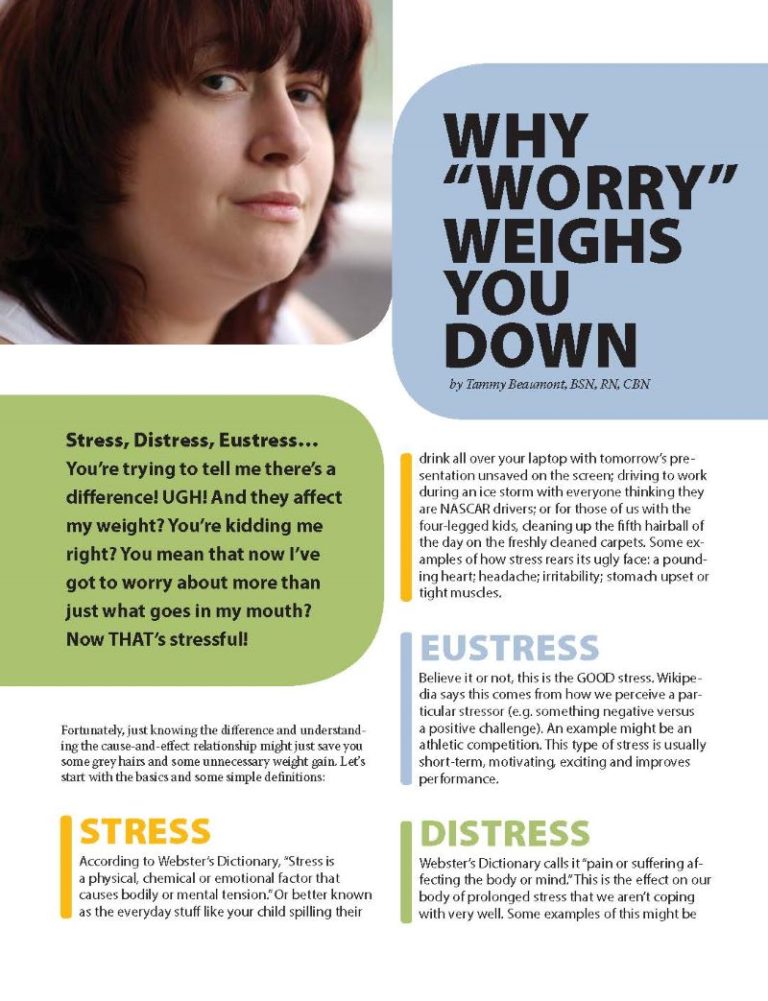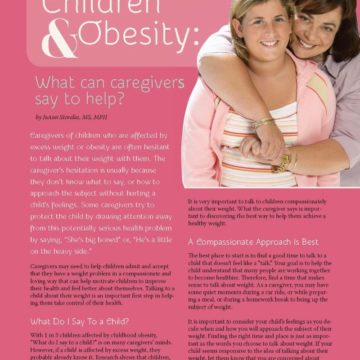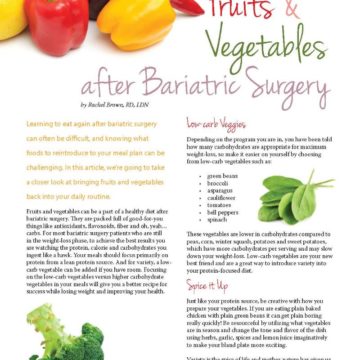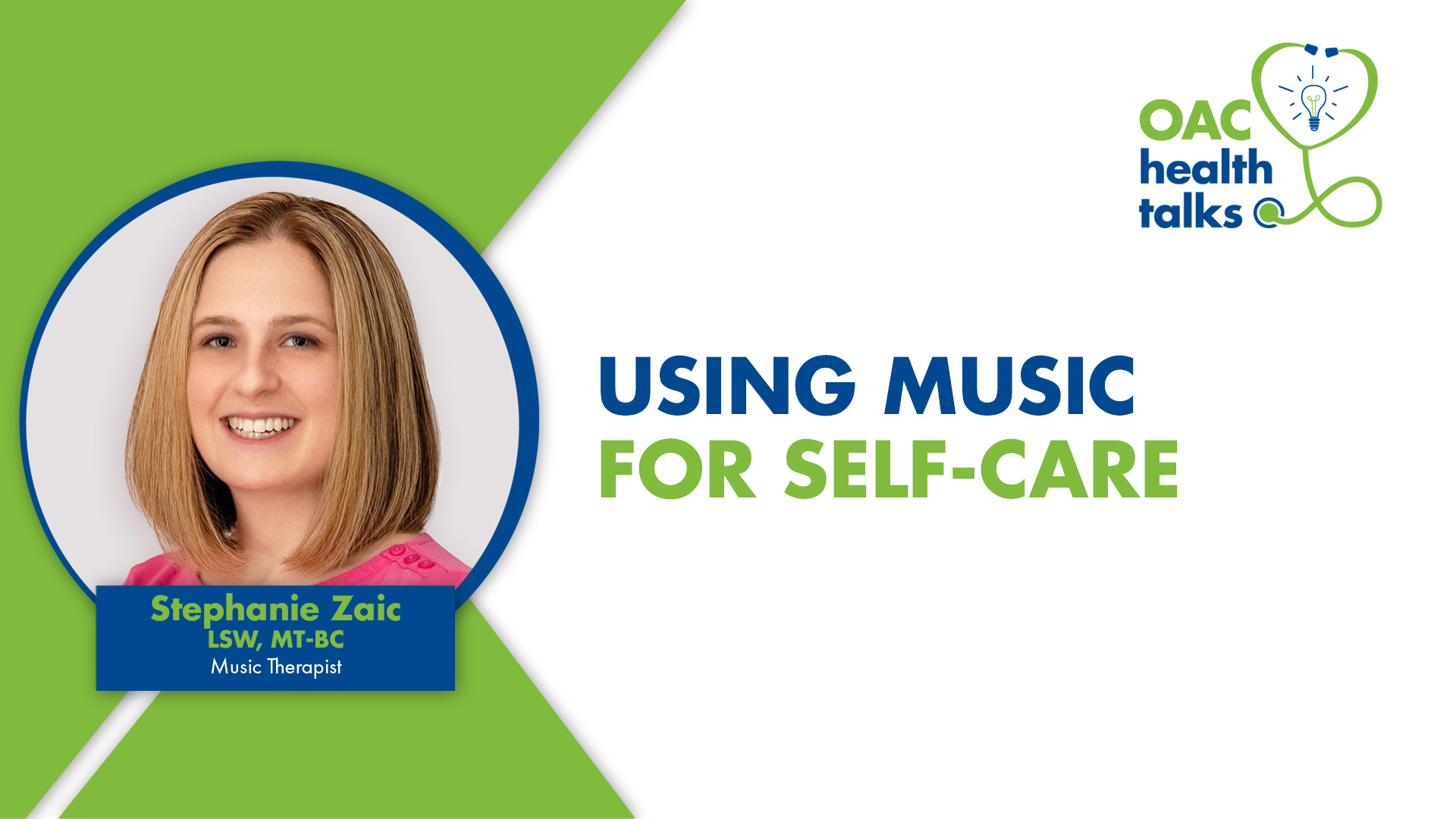Why “Worry” Weighs You Down


by Tammy Beaumont, BSN, RN, CBN
Spring 2013
Stress, Distress, Eustress…You’re trying to tell me there’s a difference! UGH! And they affect my weight? You’re kidding me right? You mean that now I’ve got to worry about more than just what goes in my mouth? Now THAT’s stressful!
Fortunately, just knowing the difference and understanding the cause-and-effect relationship might just save you some grey hairs and some unnecessary weight gain. Let’s start with the basics and some simple definitions:
Stress
According to Webster’s Dictionary, “Stress is a physical, chemical or emotional factor that causes bodily or mental tension.” Or better known as the everyday stuff like your child spilling their drink all over your laptop with tomorrow’s presentation unsaved on the screen; driving to work during an ice storm with everyone thinking they are NASCAR drivers; or for those of us with the four-legged kids, cleaning up the fifth hairball of the day on the freshly cleaned carpets. Some examples of how stress rears its ugly face: a pounding heart; headache; irritability; stomach upset or tight muscles.
Eustress
Believe it or not, this is the GOOD stress. Wikipedia says this comes from how we perceive a particular stressor (e.g. something negative versus a positive challenge). An example might be an athletic competition. This type of stress is usually short-term, motivating, exciting and improves performance.
Distress
Webster’s Dictionary calls it “pain or suffering affecting the body or mind.” This is the effect on our body of prolonged stress that we aren’t coping with very well. Some examples of this might be emotional responses such as depression; lack of concentration; withdrawal or physical reactions such as ulcers, high blood pressure, or the reason we’re even reading this article, weight gain!
One other important definition to know is the word “cortisol.” Cortisol is commonly called the “Stress Hormone.” Even our own hormones have it in for us! Cortisol is a hormone produced by our adrenal gland. It is released into our blood stream when our body is stressed. Just like stress, some is good, but too much is bad. Some cortisol is necessary because it helps increase energy and physical readiness to handle a stressful situation. Unfortunately, we don’t often handle stressful situations by expending more energy (exercise); therefore, that extra energy is stored.
Unfortunately it is stored as fat in the abdomen around all the vital organs and is considered the most unhealthy of fat stores. To add insult to injury, it can also cause an increase in your appetite and cravings for comfort foods high in fat and sugar.
Do you see where I am going with all this?
Now that you better understand the cause-and-effect, the million dollar question is, “How do we prevent or minimize this poisonous relationship?” I know we’ve all heard the standard, “eat better, get more sleep, learn to relax, and exercise.” While these are all true, and absolutely necessary, how about some baby steps to get you started?
As with a lot of concepts we want to remember, there is an acronym for this stress management technique called T.A.R.P.
T.A.R.P.
“T.A.R.P.” What is T.A.R.P.? I think we all know it as some kind of a protective cover from the elements right? In the context of stress management, it can also be thought of as a cover but to protect us from the destructive effects of excessive stress. So let’s figure this out:
T – “Tune In” In other words, sometimes just stepping back and recognizing the early physical and emotional symptoms we are experiencing in a particular situation. Gee, I’m sweating and my heart’s pounding.
A – “Analyze” What is the cause of your stress? Is it something you have control over like being late for a meeting or something you have no control over such as a sick child? What is it that causes me to sweat and my heart pound every time I get ready to meet with my boss?
R – “Response” How do you react to the tailgating driver on the highway? Do you pound your fists on the steering wheel and block him in so he can’t pass you, or do you scoot over and let him by in case he’s trying to rush to the emergency room because he has just been notified that his mom was involved in an accident? See how framing it differently puts you in a whole different mindset?
P – “Prevent” Develop healthier habits to prevent the controllable stressors such as leaving earlier so you’re not always late or rushing to meetings. Or better reactions to situations that you don’t have control over such as our driver on the highway.
Since eliminating stress from our lives is virtually impossible, the way we react in these situations becomes paramount to minimizing its effects. Some other techniques to help us deal with the situation include:
- Taking a Time Out – Move away from the stress or take a walk. Count to 10 before you say something you might regret later.
- Control Your Breathing – Slow deep breaths from the abdomen are more efficient and bring more oxygen to your brain.
- Muscle Relaxation – Muscles will relax deeper after they are purposefully tensed. Some will say start with your face and work down, others say from the feet up. I don’t think it really matters if you just take the time to do it! Slow abdominal breathing is also key to this activity.
Give It a Try
Let’s say we start with the face. Tighten your jaw and teeth; wrinkle your forehead and squint your eyes. Count to five and then release. Imagine the tension melting away as the muscles relax. Move onto your shoulders. Pull your shoulders toward your ears. Count to five and then release. Keep moving through all the various muscle groups.
Conclusion
As with weight management in general, there is no magic pill. These techniques will not solve all your problems or improve your stress level immediately. Like all good habits, they take time and practice to sink-in and become hardwired into your everyday life. All I can say is practice, practice, practice, don’t give up, and JUST DO IT!
About the Author:
Tammy Beaumont, BSN, RN, CBN, is an OAC Committee Member, a registered nurse, a certified bariatric nurse and an obesity survivor who had gastric bypass surgery seven years ago and has maintained a 135 pound weight-loss. Since then she has changed the focus of her nursing career and now works with patients wanting to follow the same journey to a healthy lifestyle.
by Robyn Pashby, PhD Winter 2024 “No one is ever going to date you if you don’t…
Read Articleby Leslie M. Golden, MD, MPH, ABOM Diplomate Winter 2024 The journey to overcoming obesity is a…
Read ArticleDid you know that stress can have an impact on weight? Many people increase their food intake…
View Video









